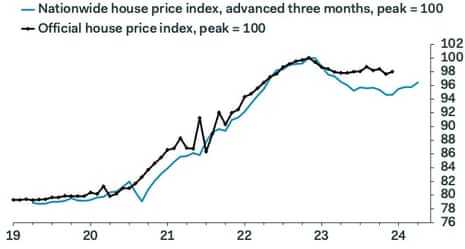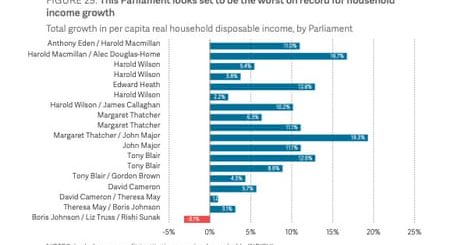UK inflation steady in January; Uber to buy back $7bn in shares after first profit – as it happened | Business
Closing post: Bank of England governor says more evidence of slower wages needed
Bank of England governor Andrew Bailey has said that he wants to see more evidence of slowing wage growth before being confident that inflation will return to target, in evidence to parliament on Wednesday.
Bailey said that the latest wage growth figures showed signs that pay rises were slowing, but not as far as the Bank expected, in testimony to the House of Lords economic affairs committee.
US inflation surprised financial markets with a higher than expected reading on Tuesday. Today it was the turn of the UK, but the surprise came the other way.
UK annual inflation remained at 4%, when economists were convinced that the consumer price index (CPI) would rise slightly because of higher energy bills.
The slight downside surprise prompted a move down for sterling against the US dollar, and has helped the FTSE 100 to a 0.8% gain, outpacing the rest of Europe’s benchmark indices.
However, Bailey told the committee that services inflation was not compatible with the Bank’s 2% target. The price of services rose to 6.5% in January from 6.4% in December.
You can watch Bailey’s testimony live here.
The key question is whether the Bank of England will see the milder inflation reading as support for cutting interest rates sooner rather than later. Financial markets are pricing in a 50/50 split between bank rate remaining at 5.25% by the Bank’s June monetary policy meeting and it falling to 5% – a single cut.
Market bets imply only a one-in-five chance of a rate cut in the previous meeting in May.
Janet Mui, head of market analysis at RBC Brewin Dolphin, said:
It is a relief to see UK inflation coming in below expectations. The main downward driver came from heavy discounting of furniture and household goods, and a further slowdown in food inflation to the lowest level since April 2022 is very welcome news.
If we see more easing in services inflation together with some weakness in economic data by then, the Bank of England would be more open to and comfortable with starting to cut rates in the second half of this year.
Pushpin Singh, senior economist at the Centre for Economics and Business Research, said:
The concern for policymakers will be that services inflation ticked up again in January, driven largely by elevated wage growth rates. Because of this, Cebr expects the Bank of England to remain cautious by not cutting rates before May and only doing so gradually thereafter.
You can continue to follow our live coverage from the around the world:
In UK politics, it is the final day of campaigning in the Kingswood and Wellingborough byelections
In US politics, Democrats decry Republicans’ impeachment of homeland security secretary Alejandro Mayorkas as a ‘sham’
In our coverage of the Russia-Ukraine war, Ukrainian forces destroy a large Russian landing ship off Crimea
In our coverage of the Middle East crisis, the World Health Organization accuses Israel of impeding aid delivery in Gaza
Thanks for reading today, and please join us tomorrow for more. Next up: UK GDP. JJ
Key events
US stock markets have opened on Wednesday with fairly strong gains.
Here are the opening snaps from Wall Street, via Reuters:
-
S&P 500 UP 28.94 POINTS, OR 0.58 PERCENT, AT 4,982.11
-
NASDAQ UP 124.33 POINTS, OR 0.79 PERCENT, AT 15,779.93
-
DOW JONES UP 125.54 POINTS, OR 0.33 PERCENT, AT 38,398.29
If you’re intrigued by the world of “romantasy” that has helped Bloomsbury to its highest ever share price, then you are not the only one: the romance genre is doing well enough that dedicated shops are opening for it.
Bookshops focusing one genre are not new (shout-out to detective specialist No Alibis in Belfast, Northern Ireland) but romance is being propelled by Instagram, TikTok and Facebook.
At least eight other dedicated romance novel bookstores opened across the US in 2023, in cities from Wichita, Kansas, to Belfast, Maine, writes the Guardian’s Lois Beckett. At least three more have opened so far in 2024, in Florida and in Utah, with another planned in Portland, Oregon.
As a genre, romance is defined by its focus on a central love story, and by its promise of a “happily ever after” for its main characters – or at least, in more contemporary novels, a “happy for now”. Romance connoisseurs often refer to the amount of sex in the novels as a book’s “spice level”, which from ranges from quite mild to very spicy indeed.
You can read the full report here:
The FTSE 100 is up by 0.85% for the day, a 63-point gain which makes it the strongest performer in Europe. It has been helped by the milder inflation figures, which suggest that interest rates could drop sooner rather than later.
Germany’s Dax is up by 0.35%, and France’s Cac 40 is up by 0.6%.
The good mood on stock markets looks likely to pass through to Wall Street. Futures trading suggests that the benchmark S&P 500 index will gain 0.5% when it opens in 45 minutes, while the tech-focused Nasdaq is due for a 0.6% increase.
The Harry Potter publisher Bloomsbury has jumped 10% to a new record high after strong 2023 results.
Bloomsbury has lifted its annual profit forecasts after the latest novel from the fantasy author Sarah J Maas topped bestseller lists across the globe, the Guardian’s Jack Simpson writes.
The British publishing company told investors that its profits for the year would be ahead of December expectations, attributing much of this to the release of Maas’s latest book, House of Flame and Shadow.
The novel, which was released on 30 January, is the third book in Maas’s series that follows Bryce Quinlan, a half human, half fairy-like creature, in the fantasy Crescent City.
Maas’s “romantasy” books have gained mass popularity around the world, and House of Flame and Shadow became the number one bestseller in the US, UK, Australia and a number of other countries.
In the UK, it became the third-fastest-selling fantasy novel since records began, with 44,761 copies sold in its first week. The company said the new release had also driven demand for the previous 15 books written by Maas for Bloomsbury.
You can read the full report here:
Uber announces first ever $7bn share buyback
Uber has said it will launch a $7bn (£5.6bn) share buyback – its first ever – shortly after the taxi-hailing company reported a debut annual operating profit.
The company reached the operating profit landmark for 2023 after years of agggresive expansion across the world. That came with more than its fair share of controversy.
But the company has changed its approach, and is now focusing on profitability.
Prashanth Mahendra-Rajah, Uber’s chief financial officer, said:
Today’s authorization of our first-ever share repurchase programme is a vote of confidence in the company’s strong financial momentum. We will be thoughtful as it relates to the pace of our buyback, beginning with actions that partially offset stock-based compensation, and working towards a consistent reduction in share count.
(Let’s hope there aren’t any extra zeros in the press release like Uber’s rival, Lyft, earlier…)
British weapons manufacturer BAE Systems has said it has got regulatory approval to take over American company Ball Aerospace.
That opens the way for the completion of the $5.5bn (£4.4bn) cash and debt deal by the FTSE 100 company.
Ball Aerospace’s parent company, Ball Corporation, traces its roots back to making paint cans and glass jars in the 1880s in Buffalo, New York, and it now makes beer cans and aerosol bottles by the million. But it was Ball’s space business that caught BAE Systems’ eye.
The aerospace business, up for sale since June, specialises in instruments, sensors and spacecraft, including some of the most sensitive satellite technologies, as well as civilian applications such as monitoring weather patterns. Ball’s optics technologies were used on the Hubble space telescope and it built the Kepler telescope used to search for Earth-like planets.
Charles Woodburn, chief executive of BAE Systems, said:
In recent years, we’ve said that we would seek out opportunities to grow our portfolio in advanced technology areas that meet our customers’ most urgent needs, and completing the acquisition of Ball Aerospace is an example of that strategy in action.
The deal was first announced in August:
Jack Simpson
Train drivers at five rail operating companies in Great Britain have voted to back a mandate that will allow them to continue striking for the next six months.
Drivers from Chiltern Railways, c2c, East Midlands Railway and TransPennine Trains, all voted overwhelmingly in support of the mandate, which is a legal requirement for unions to continue industrial action.
There are now live mandates at the remaining eleven train operating companies that Aslef, the drivers’ union, is in dispute with.
It comes two weeks after rolling strikes by Aslef across different regions caused widespread disruption for travellers across the country, with the majority of services cancelled.
Mick Whelan, general secretary of Aslef, said:
These results show – yet again – a clear rejection by train drivers of the ridiculous offer put to us in April last year by the Rail Delivery Group on behalf of the train operating companies with whom we are in dispute.
But we remain open and willing, as ever, to talk about a revised offer. That’s why we are asking the secretary of state for transport, or the rail minister Huw Merriman, to come and meet us. Mr Harper hasn’t seen fit to talk to us since December 2022; Mr Merriman has not been in the room with us since January 2023; and the RDG has not talked to us since April last year.
Virgin Media and O2 mobile customers hit with 8.8% bills increase

Mark Sweney
Millions of consumers with Virgin Media O2 are set to hit with the biggest increase in bills in the UK telecoms market this year, after the telecoms company revealed an inflation-busting 8.8% rise.
Most of the main operators have mid-contract bill rises written into contracts that are linked to the consumer prices index (CPI) measure of inflation for December, plus an added increase of 3.9 percentage points.
Last month, BT, which also owns mobile operator EE, Vodafone and Three unveiled a 7.9% increase in customers’ bills which will kick in from around April. Sky announced an increase of 6.7%.
However, Virgin Media O2, which merged in 2021, follows the January rate of the higher retail price index (RPI) measure, plus an additional 3.9 percentage points. This means that a typical customer is facing an 8.8% increase in their bills from this Spring.
Rocio Concha, director of policy and advocacy at consumer watchdog Which?, said:
This month’s RPI announcement will confirm the worst fears of O2 and Virgin Media customers who now face the biggest broadband and mobile price hikes by any major provider this April. This comes on top of a more than 17% increase last year. That’s a huge overall increase that most people would not have anticipated when they first took out their broadband or phone deal.”
Last year, it was only O2 customers who faced a steeper rise, but now Virgin Media has joined its merger partner in following the higher RPI measure of bill increases.
Virgin Media O2 points out that for mobile customers the rise does not affect their entire bill, which includes payments to own a mobile phone, and will only apply to the cost of their airtime contracts, or what customers pay for calls, texts and data.
The company said that this makes the effective price increase for mobile customers 5% this year, while for Virgin Media customers the rise will equate to an average £4.16 per month, “around the cost of a takeaway coffee”.
A spokesman for Virgin Media O2 said:
We are investing heavily to ensure we continue to provide the fast and reliable connectivity our customers rely on, and the amount we receive from price increases is greatly outweighed by the £5m we invest every single day to upgrade our networks and services to give customers a better overall experience. It’s clear that we continue to offer excellent value, with customers paying less and receiving more.”
In December, Ofcom proposed banning index-linked rises, saying they were too confusing for consumers.
Last month, BT become the first big telecoms company to scrap the inflation-linked price rises for mobile and broadband customers, although not before pushing through a final increase this year.
The official housing data from the Office for National Statistics is behind measures from lenders Nationwide and Halifax. So we have a good sense that the broader ONS measure is likely to recover in the coming months.
On a seasonally adjusted basis, the average UK house price increased by 0.3% in December 2023, following a month-on-month decrease of 0.7% in November 2023.
Nevertheless, some economists believe prices may have a bit further to decline. They are down by 2.4% below the September 2022 record.
Gabriella Dickens, senior UK economist at Pantheon Macroeconomics, said
We continue to expect a 5% peak-to-trough fall, though the risks appear to be skewed towards a smaller decline. Further ahead, we expect the official measure to follow the Nationwide measure and start to rebound, as the fall in mortgage rates and recovery in real incomes boosts affordability.

Barret Kupelian, chief economist at PwC UK, an accountancy firm, said:
House prices grew marginally on a seasonally adjusted basis in the last month of 2023 and private rental inflation has stabilised. This could be the first in a series of steps leading up to a return to some semblance of normality in the residential property market.
In the short term, leading indicators suggest that downward pressure on house prices continue to ease, with London leading the trend (…) With supply of housing subdued and demand returning, house prices growth is therefore likely to pick up pace in the next few months.
UK house prices drop 1.4% in year to December
For house buyers, rather than renters, prices fell – but at a slower rate than before.
UK house prices fell by 1.4% in the year to December, according to the Office for National Statistics. That was a slower decline than the 2.3% in the year to November.
The average UK house price was £285,000 in December 2023, which was £4,000 lower than 12 months previous.
UK rental prices rose by 6.2% in the year to January, remaining at the fastest rate of growth since the measure was introduced in 2016.
The Office for National Statistics said:
-
Annual private rental prices increased by 6.1% in England, 7.0% in Wales and 6.8% in Scotland in the 12 months to January 2024.
-
Within England, London had the highest annual percentage change in private rental prices in the 12 months to January 2024, at 6.9%, while the North East saw the lowest, at 4.7%.
The biggest surprise in today’s European data is not on GDP: it is the 2.6% jump in industrial production across the eurozone.
It was Ireland that drove that increase – industrial production was up by 44%.
But when it comes to Irish economic data, sometimes a bit of caution is required. Ireland’s economy has a lot of foreign money flowing through it without leaving much of a mark in the real world. This is a slightly different issue, but a similar one.
Bert Colijn, senior economist at ING Bank, said that he reckons the truer figure is probably about 0.3%:
Eurozone industrial production experienced an Ireland driven jump in December, this should be interpreted with caution given Irish volatility thanks to the big share of contract manufacturing and outsourcing in Irish production. pic.twitter.com/R3d2T5IMDK
— Bert Colijn (@BertColijn) February 14, 2024
Excluding Ireland we estimate that production grew by 0.3% in the eurozone, still defying continued German weakness where production declined by -1.2% in December. But while that is an encouraging note at the end of 2023, the overall trend for the eurozone excl Ireland was down. pic.twitter.com/NvwwIp4SsC
— Bert Colijn (@BertColijn) February 14, 2024
Joshua Mahony, chief market analyst at Scope Markets, a trading platform, said:
With industrial production enjoying a 2.6% jump in December (best since mid-2022), we are seeing some signs that the region is starting to pick up after what has been a particularly tough few years for manufacturers.
Germany’s economy – the largest in Europe – contracted by 0.3% in the final quarter of 2023.
But the overall bloc was held up by Spain, whose economy grew by 0.6% in the quarter. Its neighbouring economy, Portugal, rose by 0.8%.
But there was good news in the employment figures. Euro area employment rose by 1.3% year-on-year in the final quarter. That was above the 1.1% expected by economists.
Eurozone GDP unchanged at 0%, meaning bloc avoided recession
The latest eurozone GDP figures have confirmed that the bloc narrowly avoided a recession in the final three months of 2023 – while employment increased more than expected and industry surprised economists with strong growth in output.
Statistics office Eurostat confirmed that GDP grew 0% in the final quarter of 2023, in line with the preliminary reading. Output had declined by 0.1% in the previous quarter – and that reading was also confirmed.
Two quarters of consecutive declines in output are usually counted as a technical recession. In this case the bloc has avoided that fate – although its economy is still struggling.



